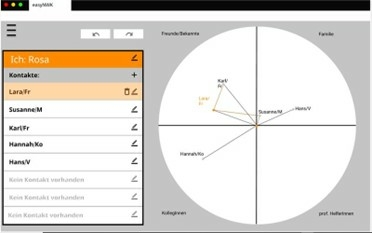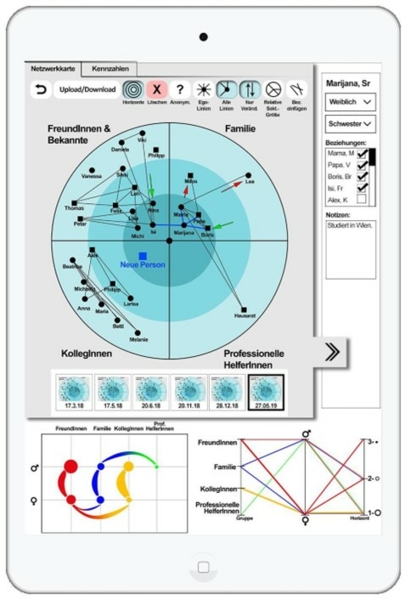Development history
easyNWK - Software for the creation of digital network maps
With the ego-centred network map in the version by Peter Pantuček-Eisenbacher, relationships with family members, friends/acquaintances, colleagues and professional helpers are mapped. The visualisation and cooperative analysis of the network structure and the accessible social support potential is the starting point for inclusion- and health-promoting interventions.
Currently, an international project group is working on updating the software to provide a modern, web-based software solution for the digital application of the network map. Within the TransSoDia project, the requests reported by the users regarding the improvement of input options, visualisation forms and automated evaluations are being realised. The project runs from 01.04.2022 to 31.03.2025 and is co-financed by the European Union within the Erasmus+ programme. On the part of St. Pölten University of Applied Sciences, the content developments are coordinated by Alexander Rind from the Institute for Creative\Media/Technologies and Karin Goger from the Ilse Arlt Institute for Social Inklusion Research. The current version of the free open source web app is available here.
For a first web-based prototype of the easyNWK, funding was generated from the Digital Innovation Hub DIH-OST.at of the Federal Ministry for Digitalisation and Economic Location in the period 2020-2022. In close cooperation with users, Alexander Rind and Karin Goger developed the basis for the first software that can be used on mobile devices.
The current web app is based on the first version of easyNWK. It was developed in 2009-2011 at the Ilse Arlt Institute for Social Inclusion Research at the University of Applied Sciences St. Pölten by Nikolaus Kelis, Master student in the Industrial Simulation programme, in cooperation with Master students in Social Work under the scientific supervision of Peter Pantuček-Eisenbacher and Sabine Sommer. The programme is available in the archive of this website.
The easyNWK has established itself within the professional community in German-speaking countries as a participative method for visualising the existing relationship network of clients. The easyNWK is also used in ego-centred network research. The application experiences of counsellors and researchers show the benefits, but also the limitations of the existing software. Since the programming language is now outdated and the software cannot be used on many mobile devices, further development of the tool is necessary.
Establishment of the easyNWK
As part of the Erasmus+ funded transnational higher education cooperation "TransSoDia - Cooperative Social Diagnostics transnational and digital teaching and learning", easyNWK is being further developed. The existing web-based programme for visualising and analysing ego-centred networks, easyNWK, will be extended with specific functions that meet the requirements of teaching and practice in the three participating countries. In addition to the complexity-reducing visualisation of social relationships, it should also be possible to represent qualities of relationships and types of experienced social support through variations of the network map.
For people with low abstraction skills, the representation of networks should be made possible through pictures and photos. In addition, other suggestions generated in the participatory and iterative course of the project will be incorporated into the programme.
The project is also developing concepts for transnational teaching activities in the field of social diagnostics and digital toolkits with articles, presentations, guides, teaching videos and manuals on the topic. Information on the project can be found at: https://research.fhstp.ac.at/projekte/transsodia-kooperative-soziale-diagnostik-transnational-und-digital-lehren-und-lernen
Funded by the European Union. Views and opinions expressed are however those of the author(s) only and do not necessarily reflect those of the European Union or OeAD-GmbH. Neither the European Union nor the granting authority can be held responsible for them.
In spring 2020, a framework for the participatory development of a new software solution was found in the DIH-OST project track.
Based on the experiences of SMEs and one-person companies from the social and health sectors, e.g. (occupational) social work, psychotherapy, supervision/coaching, organisational and business consulting, training, etc., technical and content-related requirements for the ego-centred network map were collected and taken into account in the further development. Further information can be found under: DIH-Ost 1 and DIH-Ost 2
As part of her bachelor's thesis in the Media Technology 2019 degree programme, Monika Trajković developed a new concept for the easyNWK .
Development of the first software solution easyNWK and testing within the scope of the master project sodia.


